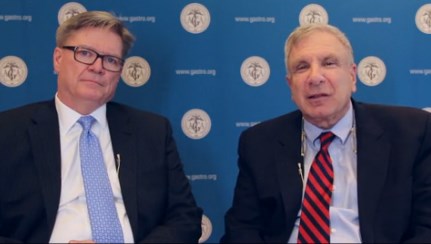User login
BOSTON – Five “revolutionary” forces in medicine are going to impact patients and physicians, two health care consultants say, and the federal government will act either as a brake or an accelerator on those forces.
In a video interview conducted during the 2017 AGA Tech Summit, Patrick D. Pilch, managing director and national healthcare advisory leader at the BDO Center for Healthcare Excellence and Innovation, New York, and his colleague David B. Friend, MD, MBA, managing director and chief medical officer at the center, discussed these market forces and their potential effects on the practice of medicine.
One such force is the convergence of molecular biology and computer science, which will lead to the creation of new medical devices that use software and will require Food and Drug Administration approval, including devices that can remotely monitor patient compliance with taking medication. Some health care apps also would need FDA approval.
“Increasingly, health care will be mobile,” Dr. Friend continued. “The concept of the right care at the right place at the right time at the right cost is going to increase, and the ability to deliver this in the mobile setting is going to be very powerful.”
A change in who bears financial risk is another important driver. Insurance companies are decreasing their risk, Dr. Friend said, while health care providers and health systems are bearing more financial risk as they increasingly accept bundled payments and value-based payments. Physicians will need to understand and be prepared for this shift in risk, he warned.
Dr. Friend also noted a move toward an integrated supply chain model that will have “profound implications” throughout the delivery process and a movement of care away from the hospital to a nonhospital setting such as home care or skilled nursing facilities.
The summit was sponsored by the AGA Center for GI Innovation and Technology.
BOSTON – Five “revolutionary” forces in medicine are going to impact patients and physicians, two health care consultants say, and the federal government will act either as a brake or an accelerator on those forces.
In a video interview conducted during the 2017 AGA Tech Summit, Patrick D. Pilch, managing director and national healthcare advisory leader at the BDO Center for Healthcare Excellence and Innovation, New York, and his colleague David B. Friend, MD, MBA, managing director and chief medical officer at the center, discussed these market forces and their potential effects on the practice of medicine.
One such force is the convergence of molecular biology and computer science, which will lead to the creation of new medical devices that use software and will require Food and Drug Administration approval, including devices that can remotely monitor patient compliance with taking medication. Some health care apps also would need FDA approval.
“Increasingly, health care will be mobile,” Dr. Friend continued. “The concept of the right care at the right place at the right time at the right cost is going to increase, and the ability to deliver this in the mobile setting is going to be very powerful.”
A change in who bears financial risk is another important driver. Insurance companies are decreasing their risk, Dr. Friend said, while health care providers and health systems are bearing more financial risk as they increasingly accept bundled payments and value-based payments. Physicians will need to understand and be prepared for this shift in risk, he warned.
Dr. Friend also noted a move toward an integrated supply chain model that will have “profound implications” throughout the delivery process and a movement of care away from the hospital to a nonhospital setting such as home care or skilled nursing facilities.
The summit was sponsored by the AGA Center for GI Innovation and Technology.
BOSTON – Five “revolutionary” forces in medicine are going to impact patients and physicians, two health care consultants say, and the federal government will act either as a brake or an accelerator on those forces.
In a video interview conducted during the 2017 AGA Tech Summit, Patrick D. Pilch, managing director and national healthcare advisory leader at the BDO Center for Healthcare Excellence and Innovation, New York, and his colleague David B. Friend, MD, MBA, managing director and chief medical officer at the center, discussed these market forces and their potential effects on the practice of medicine.
One such force is the convergence of molecular biology and computer science, which will lead to the creation of new medical devices that use software and will require Food and Drug Administration approval, including devices that can remotely monitor patient compliance with taking medication. Some health care apps also would need FDA approval.
“Increasingly, health care will be mobile,” Dr. Friend continued. “The concept of the right care at the right place at the right time at the right cost is going to increase, and the ability to deliver this in the mobile setting is going to be very powerful.”
A change in who bears financial risk is another important driver. Insurance companies are decreasing their risk, Dr. Friend said, while health care providers and health systems are bearing more financial risk as they increasingly accept bundled payments and value-based payments. Physicians will need to understand and be prepared for this shift in risk, he warned.
Dr. Friend also noted a move toward an integrated supply chain model that will have “profound implications” throughout the delivery process and a movement of care away from the hospital to a nonhospital setting such as home care or skilled nursing facilities.
The summit was sponsored by the AGA Center for GI Innovation and Technology.
EXPERT ANALYSIS FROM THE AGA 2017 TECH SUMMIT
